ROTH Vathana
Former Technical Advisor
Roth Vathana was a research fellow and director of the Centre for Development Economics and Trade at the Cambodia Development Resource Institute. His main research interests include: the nexus of economic growth, poverty and inequality, rural economic revitalization and financial inclusion, private sector development, and impact evaluation using microeconometric modelling. He also has extensive experience particularly in managing and analyzing complex and large-scale cross-sectional and panel survey data. He holds a Master of Economics from Kobe University, Japan.
Email : vathana@cdri.org.kh

This study investigates the profitability and technical efficiency of chilli farming in Cambodia using data from 542 households and 719 plots across six provinces. Employing a revenue-cost framework and stochastic frontier analysis, the research evaluates yields, input costs, and production efficiency. Bird’s eye and lady’s finger chillies are the...
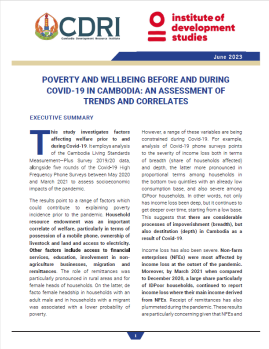
Poverty and Wellbeing Before and During Covid-19 in Cambodia: An Assessment of Trends and Correlates
This study investigates factors affecting welfare prior to and during Covid-19. It employs analysis of the Cambodia Living Standards Measurement—Plus Survey 2019/20 data, Frequency Phone Surveys between May 2020 and March 2021 to assess socioeconomic impacts of the pandemic. The results point to a range of factors which could contribute to expla...
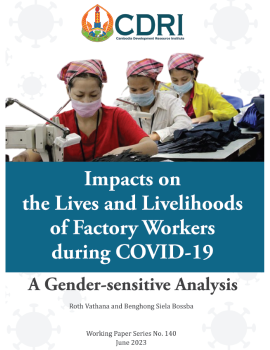
This study examines the gendered impacts of COVID-19 on Cambodia’s garment, textile, and footwear (GTF) sector, which employs around 800,000 workers—80 percent of whom are women. Using data from a phone survey of 2,000 workers conducted in mid-2021, the study explores changes in earnings, consumption, remittances, mental health, domestic responsibi...
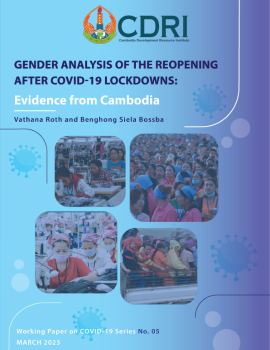
We quantify the effects of reopening economic activities after the COVID-19 pandemic lockdown on the lives and livelihoods of the workers in the garment, footwear, and travel goods sector in Cambodia. We employ fixed-effects difference-in-differences and quantile regression analyses using a panel survey of 2,000 workers interviewed by phone in...
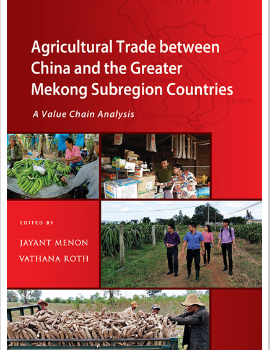
The book is published at ISEAS – Yusof Ishak Institute and can be found on this website.
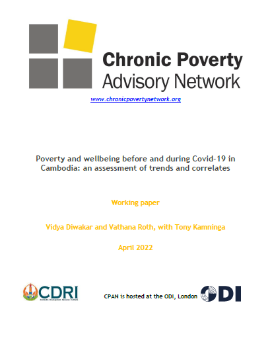
Poverty and Wellbeing Before and During Covid-19 in Cambodia: an Assessment of Trends and Correlates
This study investigates factors affecting welfare prior to and during Covid-19. It employs analysis of the Cambodia Living Standards Measurement—Plus Survey 2019/20 data, alongside five rounds of the Covid-19 High Frequency Phone Surveys between May 2020 and March 2021 to assess socioeconomic impacts of the pandemic.The results point to a range of...
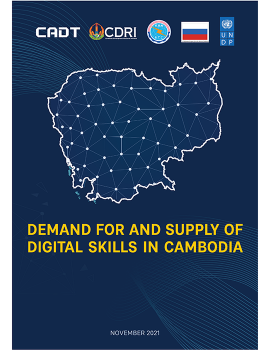
The study assesses current and future demand for and supply of digital and ICT skills and investigates the challenges firms of all sizes, universities, and TVET institutions face in preparing themselves and their students for digital technology adoption under the framework of the Fourth Industrial Revolution (4IR). A mixed-methods approach of quant...
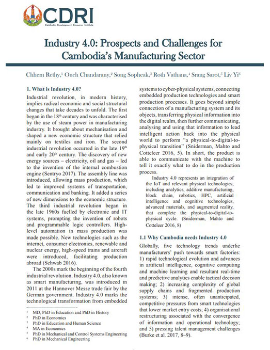
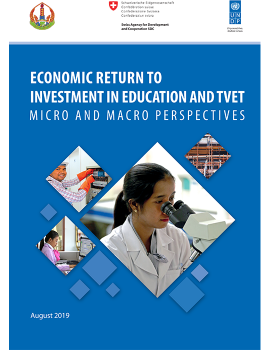
This study is a part of the UN Joint Programme through which the UNDP seeks to examine the relationship between the economic/monetary returns of investments in education and technical vocational education and training (TVET) at individual, household and national levels. The overall objectives of the study are (1) to estimate the rate of return at t...
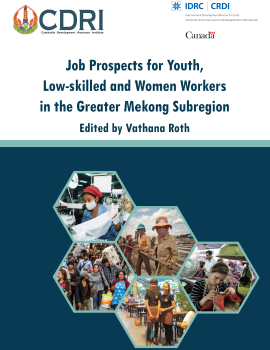
This publication is a collection of 11 original research papers on six themes: earnings inequality; labour market regulation and wage setting; safety nets for low-income, low-skilled workers; private sector engagement in skills development; implications for labour market policies and institutions of the ASEAN Economic Community; and strategies to s...

A collaboration with a team of researchers from the University of Ludwig-Maximilians (LMU), Munich to conduct an experimental survey to investigate the impact of persistent memories of violence and the impact of salient memories. The survey is to be conducted in 50 communes in provinces around the Tonle Sap, interviewing 1,500 randomly selected hou...
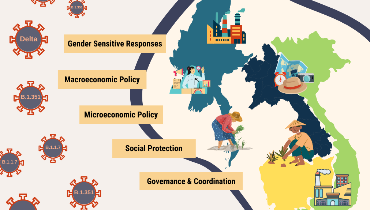
In close coordination with local governments and organizations, the project will identify gender-sensitive policies and good practices from the macro to micro level that will support the recovery process and improve resilience among vulnerable women workers and micro, small, and medium enterprises. It will facilitate policy dialogue and coordin...

The recent coronavirus pandemic has triggered economic crises in both developing and developed countries. In the case of Cambodia, the number of infections is low relative to other neighbouring ASEAN countries, such as Thailand, Philippines, and Indonesia. However, several sectors have been seriously affected by the non-pharmaceutical measures and...

Under the Capacity Building Research and Development Fund of the Ministry of Posts and Telecommunications, United Nation Development Programme, Cambodia and the Russian Federation, the Cambodia Development Resource Institute in collaboration with the Cambodia Academy of Digital Technology (formerly known as the National Institute of Posts, Telecoms...
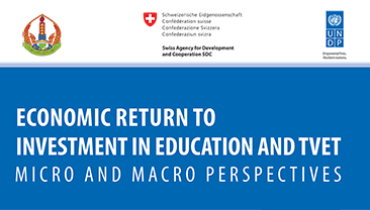
As part of the UN Joint Programme, UNDP seeks to examine the relationship between the economic/ monetary returns at individual, household and national level of investments in education and technical vocational education and training (TVET). Therefore, this study will be done in concerted efforts with the Ministry of Education Youth and Sport (MoEY...
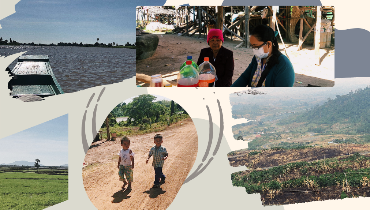
CDRI has collected and maintained a panel data of households in rural Cambodia. The work started in 1996-97 when CDRI conducted a benchmark survey of three villages—Prek Khmeng, Babaong and Trapeang Prey. Data collection has been regular (one every three years) surveying 1,183 sample households in 11 rural villages, representing the four geographic...
